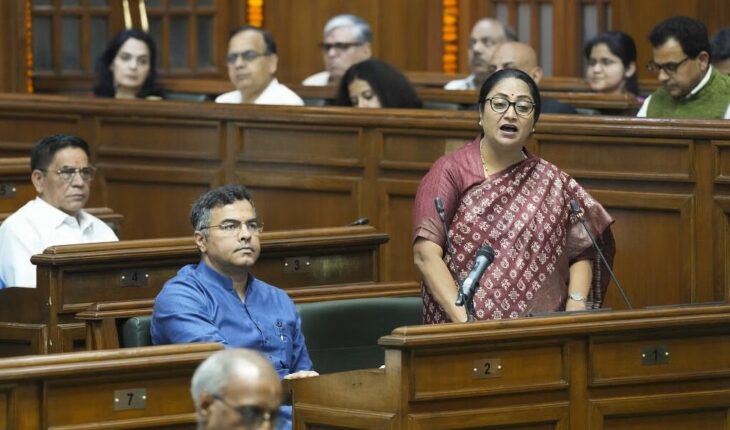New Delhi: Delhi Chief Minister Rekha Gupta presented a Rs 1 lakh crore budget for the fiscal year 2025-26, marking a substantial 31.5% increase from the previous year’s Rs 76,000 crore. With a sharp focus on infrastructure, public transport, education, healthcare, and environmental sustainability, the budget proposes no new taxes while aiming for balanced growth and economic resilience.
Terming it a roadmap for a “progressive and sustainable Delhi,” CM Gupta said the budget is a commitment to building a stronger, more inclusive, and environmentally conscious city. She emphasized that the focus remains on better infrastructure, improved public services, and a cleaner environment.
Infrastructure receives the highest allocation at Rs 28,000 crore, doubling last year’s capital expenditure. Of this, Rs 12,952 crore will be used for road expansion, flyover construction, and drainage improvements, while Rs 1,000 crore is earmarked to enhance Delhi-NCR connectivity. Gupta highlighted that a well-planned city with robust infrastructure is essential for economic growth, aiming to transform Delhi into a global city with world-class facilities.
Public transport has been allotted Rs 13,300 crore, including Rs 7,500 crore for addressing Delhi Transport Corporation’s (DTC) operational inefficiencies and fleet management. Another Rs 5,800 crore is dedicated to public transport modernization, including the addition of 2,000 electric buses. A policy has been introduced to phase out 10-year-old diesel buses and replace them with electric alternatives by 2027. The Chief Minister underscored the significance of sustainable transport in reducing pollution and improving mobility.
The education sector has received Rs 19,291 crore, with Rs 2,500 crore set aside for school infrastructure upgrades, including 500 new digital classrooms. An additional Rs 1,200 crore is allocated for scholarships and vocational training programs targeting underprivileged students. Gupta reiterated that education remains the cornerstone of Delhi’s future, ensuring that children receive the best learning opportunities and skills training.
Healthcare and public welfare have been allocated Rs 12,893 crore, with Rs 3,200 crore directed towards strengthening Mohalla Clinics, Rs 2,800 crore for hospital infrastructure and medical equipment procurement, and Rs 1,500 crore for maternal and child healthcare programs. The Chief Minister reaffirmed her government’s commitment to expanding and strengthening medical facilities to ensure healthcare access for all.
Environmental sustainability remains a key focus, with Rs 4,700 crore invested in pollution control measures and green initiatives. Of this, Rs 1,800 crore is allocated for solar energy adoption in government buildings, Rs 900 crore for expanding tree plantation drives and waste management reforms, and Rs 500 crore for Yamuna River cleanup efforts. Gupta stressed that Delhi’s fight against pollution continues, with these investments laying the foundation for a cleaner and healthier city.
The government expects to generate Rs 68,700 crore in revenue, including Rs 45,000 crore from tax collections and Rs 23,700 crore from non-tax sources. A Rs 10,000 crore investment from private entities is expected to support infrastructure and urban development. To manage debt, the government plans to take a loan of Rs 15,000 crore from the Centre under the National Small Savings Fund and will receive Rs 12,096 crore as grants and aid under various heads.
Despite the ambitious financial plan, concerns remain. The Comptroller and Auditor General (CAG) report has highlighted severe financial stress in DTC, raising doubts over whether the Rs 7,500 crore allocation will be sufficient to cover mounting losses. Previous budgetary allocations have faced delays in execution due to bureaucratic hurdles, and while sustainability initiatives have been announced, enforcement and long-term impact remain key concerns.
CM Rekha Gupta’s budget for Delhi aims for balanced growth, prioritizing infrastructure, public welfare, and sustainability. However, efficient implementation, financial discipline, and policy oversight will be crucial for achieving the intended outcomes. The Chief Minister reaffirmed her commitment to delivering a budget that not only addresses present needs but also secures a prosperous future for the capital.





